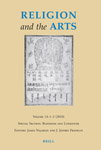This site uses cookies. By continuing to browse the site you are agreeing to our use of cookies.
I accept this policy
Find out more here
This site uses cookies. By continuing to browse the site you are agreeing to our use of cookies.
I accept this policy
Find out more here
Brill’s MyBook program is exclusively available on BrillOnline Books and Journals. Students and scholars affiliated with an institution that has purchased a Brill E-Book on the BrillOnline platform automatically have access to the MyBook option for the title(s) acquired by the Library. Brill MyBook is a print-on-demand paperback copy which is sold at a favorably uniform low price.

Against recent claims that Shakespeare satirizes and demystifies religious life in Measure for Measure, this article maintains that Shakespeare is generally sympathetic to Franciscan nuns and friars, particularly so in this play. Indeed, Shakespeare works against the anti-fraternal tradition by reversing its conventions. Nuns and friars are represented as virtue figures, not vice figures. The secular characters are guilty of sexual irregularities, whereas the religious are chaste and work to regularize the marriages of the lay figures. The usual exposure of the sexual corruption and hypocrisy of the friar backfires on Lucio, the chief vice figure in the play. The virginal and temperate Isabella, a secular figure in Shakespeare's sources, is portrayed as a prospective novice of the Poor Clares over against the puritanical Angelo, whose hypocritical asceticism turns into lust. Angelo conducts a public shaming English Protestant style, whereas the Duke in Catholic fashion conducts a sympathetic auricular confession. Finally Isabella does not sacrifice her virginity or accept the Duke's offer of marriage, two things her counterparts in the sources invariably do. Shakespeare's reversal of anti-Catholic conventions requires us to reposition him as a Catholic rather than a conforming member of the Church of England.
